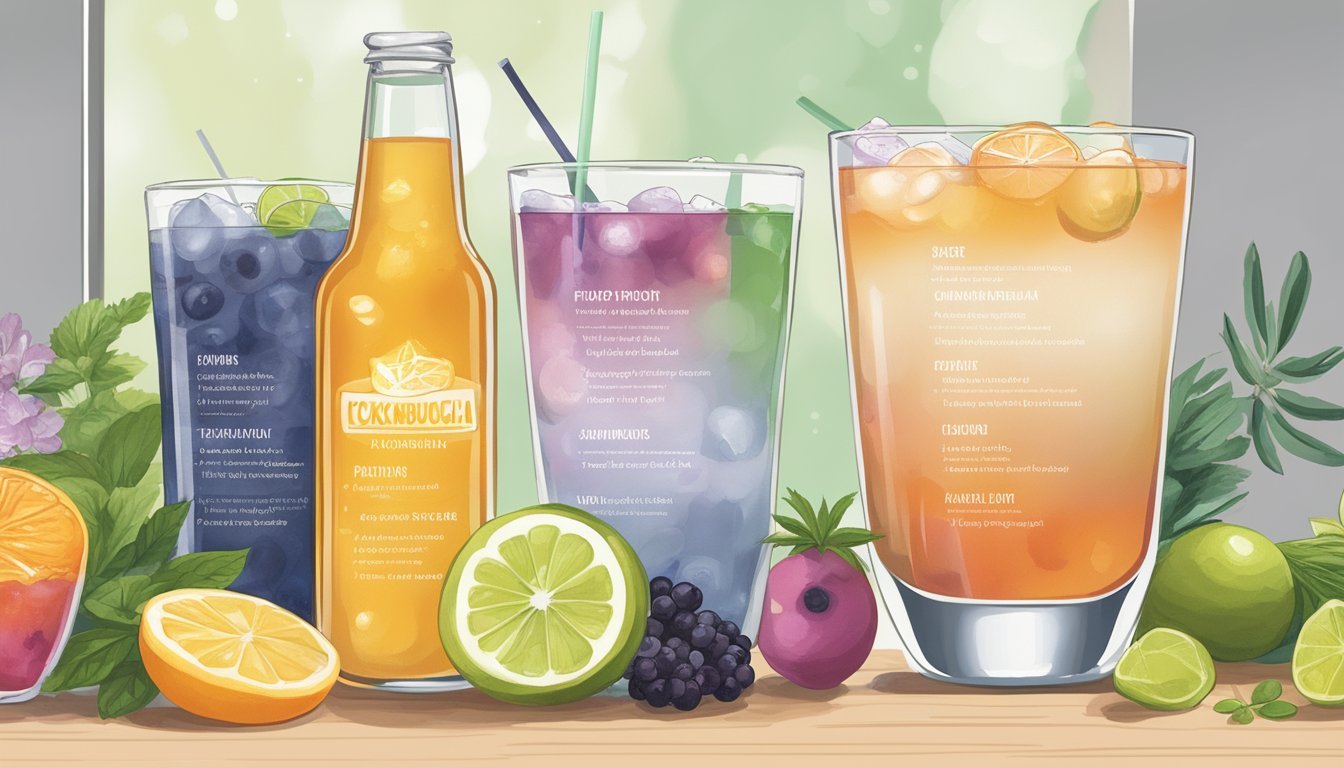Exploring the Texas Kombucha Cocktail Trend
A Fresh Twist on Social Libations
The Texas cocktail scene is witnessing a notable shift with the inclusion of kombucha, a fermented tea renowned for its probiotic properties and unique flavor profile. This trend capitalizes on the growing desire for beverages that offer more than just a pleasing taste; it leverages the health benefits associated with kombucha while catering to the evolving palates of cocktail enthusiasts. Texas mixologists are now infusing traditional cocktails with the tangy effervescence of kombucha, creating concoctions that are not only innovative but also offer a complex interplay of flavors.
Kombucha brings a new dimension to the cocktail experience with its tartness and mild acidity, which pairs well with a variety of spirits and amplifies the existing citrus or herbal notes in a drink. The beverage's naturally bubbly character adds a layer of texture that traditionally would have been achieved with carbonated mixers. This fusion approach is transforming bars across Texas, as customers increasingly seek out these kombucha-infused cocktails, illustrating a growing appreciation for beverage options that straddle the line between health-consciousness and hedonism.
As a reflection of this trend, cocktail menus are expanding to include a selection that features kombucha prominently. Whether it's by enhancing the complexity of a whiskey sour with a dose of ginger kombucha or by lightening a robust mezcal with a splash of berry-infused kombucha, Texas mixologists are demonstrating that this fermented beverage has earned its place behind the bar. The commitment to innovation and quality among Texas bartenders is ensuring that kombucha cocktails are not just a fleeting fad, but rather a staple destined to define the state's cocktail culture for years to come.
The Rise of Texas Kombucha Cocktails
The Texas kombucha cocktail trend is a novel fusion of traditional fermented tea and classic alcoholic mixology. It's a phenomenon that originated with a focus on health-conscious consumption and has since evolved into a staple of the Texan social scene.
Tracing the Origins
Kombucha, a fermented tea with ancient origins, has found its way into Texas cocktail culture as a celebrated ingredient. Initially valued for its supposed health benefits, kombucha began to appear in Texas bars as an innovative mixer. It combined the tart and effervescent characteristics of the drink with various spirits, creating a unique cocktail experience. The earliest kombucha cocktails in Texas were likely inspired by the wellness community's affinity for this probiotic-rich beverage.
Current Popularity in Texas
Today, kombucha cocktails have permeated bars and restaurants throughout Texas, from Austin's vibrant nightlife to Houston's eclectic dining scene. The drink's versatility can be seen in menus across the state, offering an array of flavors—from ginger and citrus to more exotic blends. This popularity can be attributed to both the growing interest in healthful living and the Texans' innate curiosity and openness to innovative and flavorful culinary creations.
Key Elements in Popular Kombucha Cocktails:
Base Alcohol: Common choices include dark rum, vodka, and bourbon.
Kombucha Flavors: Ginger, lemon, apple, and strawberry are favorites.
Combination: Often mixed with fresh juices or bitters.
Impact on Local Culture
Kombucha cocktails have had a notable impact on the local drinking culture in Texas. They've introduced a new way for individuals to enjoy socializing with a nod to healthier living. These cocktails offer an alternative to the traditional high-calorie alcoholic beverages, potentially aligning more closely with the dietary preferences of health-conscious Texans. The trend has also given local kombucha brewers the spotlight, showcasing the versatility of this fermented tea and further integrating it into the cultural fabric of the state.
Health Aspects of Kombucha Cocktails
The intertwining of kombucha's probiotic richness with the characteristics of cocktails presents both health opportunities and considerations. This section unpacks the health facets of kombucha in cocktails, considering the balance of alcoholic content, and the implications regarding calories.
Kombucha's Health Benefits
Kombucha is a fermented tea renowned for its probiotic content, which contributes to gut health. The fermentation process encourages the growth of beneficial bacteria and yeast, which assist in digestion and can enhance the immune system. Kombucha is also a source of antioxidants, which may help in reducing oxidative stress.
Probiotics: Aids in maintaining a healthy balance of gut flora.
Antioxidants: Helps combat oxidative stress which can lead to chronic diseases.
Alcohol vs. Probiotics
While kombucha brings probiotics to cocktails, the presence of alcohol poses a consideration for health-conscious individuals. Although alcohol can have a deleterious effect on gut bacteria, the relatively low alcohol content in kombucha cocktails, usually below 0.5%, may not have a significant impact. The interplay between the fermented beverage and alcohol requires careful calibration to sustain potential health benefits.
Low Alcohol Content: Generally insufficient to negate the benefits of probiotics, when consumed in moderation.
Probiotic Preservation: The effectiveness of probiotics remains largely intact in kombucha cocktails due to lower alcohol levels.
Caloric Content Considerations
Calories in beverages can add up quickly, and this includes kombucha cocktails. Kombucha itself is lower in calories compared to many sweetened beverages, but mixing it with alcohol and other cocktail ingredients can increase the caloric value. Awareness and mindful choices can help maintain a balance.
Kombucha: Typically contains fewer calories than many carbonated and sugary drinks.
Cocktail Additives: Syrups and liquors can significantly increase the calorie count of the cocktail.
Crafting Kombucha Cocktails
Kombucha cocktails are redefining the frontier of mixed drinks in Texas by leveraging the unique effervescence and tart flavor profile of fermented tea. These beverages showcase a blend of traditional cocktail ingredients with the health-forward and complex notes of kombucha.
Essential Ingredients
Kombucha: The backbone of these cocktails, kombucha brings a distinct sour and tangy flavor profile. Its fermentation yields effervescence, adding a lively character to the drink.
Spirits: Common spirits like gin and bourbon integrate well with kombucha, complementing its fermentation notes. Gin particularly pairs nicely due to its botanical characteristics.
Sweeteners: To balance kombucha’s inherent tartness, bartenders often use sugar or honey. These sweeteners can be used in syrups or muddled with fresh fruits to enhance the cocktail's flavor profile.
Additional Elements:
Tea: Different tea bases in kombucha can sway the cocktail's final taste.
Fruits: Citrus like lime or berry varieties add a fresh and zesty element.
Herbs: Fresh herbs or spices, especially ginger, can amplify the drink's complexity.
Art of Fermentation
Fermentation is at the heart of crafting kombucha, where sugars are converted into alcohol and carbon dioxide by yeasts. This process endows kombucha with its signature effervescence and depth of flavor, making it an excellent base for cocktails. The artful integration of fermented kombucha into mixology introduces a dynamic aspect to cocktail creation, requiring a thoughtful approach to balance and taste.
Flavor and Balance
A well-crafted kombucha cocktail pays close attention to the harmony between sour, sweet, and effervescent elements. Here's how the flavors and balance are achieved:
Sour: The tartness of kombucha needs to be calibrated with sweet components and the right spirit to prevent an overpowering sour experience.
Sweet: Sweetness, often supplied through syrups or natural fruit juices, provides a counterpoint to the sour flavor.
Bubbly: The effervescence of kombucha should complement, not compete with, the drink's flavor. Hence, mixologists carefully consider the other ingredients' intensity.
Crafting kombucha cocktails involves an interplay of these elements, ensuring a finished product that's both invigorating and enjoyable. This innovative trend speaks to a broader movement towards drinks that are as complex in taste as they are in their health-related considerations.
Popular Kombucha Cocktail Recipes
Texas has embraced kombucha in its cocktail scene, infusing traditional drinks with this fermented beverage. The recipes that follow showcase the versatility of kombucha when mixed with a variety of spirits and flavors.
Classic Kombucha Mule
The Classic Kombucha Mule replaces ginger beer with ginger kombucha, adding a tangy twist to the traditional Moscow Mule. To make one, mix:
2 oz vodka
4 oz ginger kombucha
1 oz fresh lime juice
Ice cubes
Garnish with a lime wedge and a sprig of mint
Serve the concoction in a chilled copper mug for the full experience.
Fermented Fizz Creations
Under the banner of Fermented Fizz Creations, a number of bubbly drinks stand out. One can assemble a delightful mix using:
3 oz champagne or sparkling wine
3 oz kombucha (flavor of choice, though pomegranate kombucha provides a sweet-tart profile)
A splash of orange or lime juice for added citrus notes
Stir gently in a flute glass to retain the fizz and garnish with a citrus peel.
Kombucha Margaritas and Mimosas
Kombucha Margaritas and Mimosas reinvent familiar favorites. A Kombucha Margarita craftily blends:
2 oz tequila
1 oz lime juice
4 oz citrus-flavored kombucha
Ice
Salt for the rim and a lime slice for garnish
Meanwhile, the Kombucha Mimosa is an effortless refreshment, calling for an equal mix of kombucha and orange juice, topped with champagne to taste. Serve in a champagne flute with a slice of orange.
The Science of Flavor Pairing
When one crafts cocktails with kombucha, the essence of the drink pivots on the artful blend of flavor profiles. Mastering this craft ensures each sip delivers a complex, yet balanced, sensory experience.
Taste Profiles and Combinations
The integration of kombucha into cocktails in Texas hinges on a meticulous match of taste profiles to create a balanced palette. Kombucha inherently possesses a slightly sour and fizzy trait that complements a variety of spirits and mixers. Flavor balance is crucial; for instance, a sweet component could counterbalance kombucha's tartness. They're often married with citrus juices—like lemon or lime—to enhance the cocktail’s brightness.
Sweet: Simple syrup or fruit nectar
Sour: Kombucha, citrus juice
Bitter: Bitters, certain spirits
Salty: A pinch of salt
Importance of Acidity in Cocktails
Acidity plays a pivotal role in the cocktail world. It can cleanse the palate and add a refreshing contrast to sweeter ingredients. In Texas's kombucha cocktails, the subtle acidity of kombucha blends with additional acids such as citrus juice to achieve a harmonious taste. This combination elevates the beverage's profile by introducing layers of complex flavors that mingle with ease.
New to the scene:
Lime juice: Accentuates tropical flavors
Grapefruit juice: Offers a bittersweet accent
Herbs and Botanical Additions
Herbs and botanical elements infuse Texas kombucha cocktails with a fresh and aromatic twist. Bartenders carefully select these additions to complement the drinks' inherent features. Mint introduces a cool, crisp finish, while hibiscus might contribute a floral tang. When botanicals like these are added, they create an olfactory appeal that precedes the first sip.
Botanical standouts:
Mint: A breath of freshness
Hibiscus: Tart, cranberry-like flavor
Bitters: Deepens complexity
The interplay of herbs, mint, or hibiscus with kombucha integrates a natural and refined complexity into the cocktail, making each concoction a testament to the deliberate and skillful science of flavor pairing.
Kombucha Cocktail Variations
The Texas Kombucha Cocktail scene marries the tangy effervescence of kombucha with a spectrum of flavor profiles, from the sweetness of ripe fruits to the depth of spices and herbs. Enthusiasts can enjoy an array of options, with or without alcohol, tailored to their preferences.
Fruit-Infused Concoctions
They find that the natural acidity of kombucha pairs excellently with a variety of fruits. Vodka tends to be a spirit of choice due to its neutrality, allowing the fruit flavors to shine. A popular variation involves muddling strawberries or watermelon with fresh citrus juices before topping with berry-flavored kombucha. For a tropical twist, bartenders recommend combining rum with pineapple juice, reinforcing the cocktail with a fizzy pineapple or orange kombucha.
Example: The Strawberry Citrus Kombucha Cocktail
Spirit: Vodka
Fruits: Muddled strawberries, lemon juice
Kombucha: Berry-flavored
Garnish: Lemon wheel
Spiced and Herbal Twists
The addition of spices or herbs introduces a new dimension to the kombucha cocktail. Ginger flavor, known for its zesty kick, is especially favored for its compatibility with kombucha's signature tang. Drinks might include fresh ginger or ginger-infused kombucha, sometimes with an herbal garnish like mint or basil. A spiced kombucha cocktail might feature rum or even bourbon for added warmth, layered with acid from a squeeze of lemon or orange.
Example: The Ginger Spice Kombucha Cocktail
Spirit: Rum
Spice: Fresh ginger
Kombucha: Ginger-flavored
Acid: Lemon juice
Garnish: Mint sprig
Non-Alcoholic Options
For those favoring a non-alcoholic beverage, the kombucha cocktail trend does not disappoint. They can build these "mocktails" with a similar complexity of flavors as their alcoholic counterparts. The fizziness of kombucha serves as a substitute for the bite of hard liquor. Non-alcoholic variations often emphasize a burst of citrus — using lemon, orange, and other citrus juices — to play off the kombucha's natural fermented zest.
Example: Citrus Kombucha Fizz
Base: Non-alcoholic
Fruits: Lemon and orange juice
Kombucha: Original or citrus-flavored
Garnish: Orange wheel
Advanced Mixology Techniques
In the Texas kombucha cocktail trend, advanced mixology techniques revolve around innovative uses of bacterial cultures, mastery of carbonation, and artistic garnishing. These methods are employed to create a unique drinking experience that is as visually appealing as it is flavorful.
Experiments with Bacteria Cultures
The heart of a kombucha cocktail is the SCOBY (symbiotic culture of bacteria and yeast). Mixologists have been experimenting with various SCOBY cultures to influence the taste profiles of their kombucha. By adjusting factors like fermentation time and temperature, they can develop distinct flavors ranging from tart to sweet. This allows them to tailor the kombucha for use in specific cocktails, creating a drink with a complex, mature character.
Carbonation and Effervescence
Carbonation is crucial in crafting a refreshing kombucha cocktail. The naturally effervescent properties of kombucha add a lively texture to the drink. Mixologists often play with secondary fermentation techniques to increase carbonation levels, which can intensify the effervescence. They also have to balance the carbonation carefully to ensure it complements, rather than overwhelms, the cocktail's other components.
Garnishing and Presentation
Garnishes are not just decoration; they are integral to the cocktail's overall sensory experience. Texas mixologists incorporate elements like:
Basil - for a fresh, herbal touch.
Lime - to add zest and complement the kombucha's acidity.
Cinnamon - for a warm, spicy undertone.
Chamomile - introducing a subtle, floral note.
Garnishes should reflect the cocktail's flavor profile and enhance its aroma. Professional mixologists carefully select and place garnishes to achieve a presentation that is simple yet elegant, always serving a purpose beyond mere aesthetics.
Cocktail Health and Wellness
In the realm of health-centric mixology, the integration of kombucha is crafting a niche where wellness meets indulgence. This section delves into the nutritional value of kombucha-infused cocktails and dispels common misconceptions regarding hangovers.
Kombucha in Diet and Nutrition
Kombucha, a fermented tea beverage, has been lauded for its potential health benefits. Nutritionally, it is a source of probiotics, which are beneficial for gut health. It originates from a symbiotic culture of bacteria and yeast fermenting in a solution of sugar and green tea or black tea. The resulting drink contains a variety of vitamins, including B vitamins, which contribute to overall wellness.
The incorporation of kombucha in cocktails offers a desirable alternative for health-conscious consumers. Kombucha can potentially lower the calorie count of a cocktail when used in place of sugary mixers. Additionally, its antioxidant properties may help neutralize free radicals in the body, although it's important to note that consuming alcohol can negate some health benefits.
Nutrient Contribution Kombucha Typical Sugary Mixer
Calories Lower* Higher
Probiotics Present Absent
Antioxidants Present ( from tea) Variable
Vitamins B vitamins present Generally absent
*Calorie content can vary based on the kombucha brand and preparation method.
Addressing the Hangover Myth
There is a pervasive myth that certain cocktails can prevent or cure hangovers. While kombucha does contain elements that are beneficial to health, such as probiotics and vitamins, its ability to prevent a hangover from alcohol consumption is not scientifically supported. Hangovers are primarily caused by the toxic effects of alcohol and its metabolites, dehydration, and the depletion of essential nutrients.
However, some kombucha brands, like Health-Ade, advertise their beverages as containing components that may help support the body's metabolism and recovery processes. Consumers should still be aware that while a kombucha cocktail might contain healthful ingredients, it is not a remedy for the effects of alcohol consumption, and the best way to prevent a hangover remains to drink in moderation.
Incorporating Local Texas Ingredients
In the heart of Texas' kombucha cocktail trend, one finds a particular emphasis on utilizing local produce and collaborations that elevate the distinct flavors of the region.
Use of Native Fruits and Herbs
Texan mixologists are deftly integrating native fruits such as Texas Red grapefruits, Hill Country peaches, and Poteet strawberries into kombucha cocktails. These fruits add a natural sweetness and tartness, creating a balance that complements the effervescence of kombucha. In addition to fruit, there is a growing use of local herbs, including mint varieties from Texas gardens and wild-harvested sage, which can introduce an aromatic complexity to the beverages. For instance:
Herbaceous Combinations: A popular Texas kombucha might feature Ginger Nettle or Lavender Spearmint, herbs that not only enrich the flavor but are also chosen for their purported health benefits.
Collaborations with Local Breweries
The synergy between kombucha producers and local breweries has led to innovative cocktail creations. These partnerships often result in limited-edition flavors that draw heavily on Texan ingredients, reflecting the community’s spirit and palette. Breweries are combining their craft beers with kombucha, giving rise to a new category of alcoholic beverages rich in both flavors and cultures. Some note-worthy collaborations include:
Craft Beer Fusings: Local breweries may provide barrel-aged ales that, when mixed with kombucha, yield a cocktail with a unique depth and character. Such alliances promote sustainable practices by sourcing ingredients within close proximity and supporting local economies.
Role of Kombucha Cocktails in Mixology
Kombucha, a fermented tea beverage, has expanded its role in the world of mixology, introducing a unique flavor profile that bartenders leverage for innovative cocktail creation.
Bartender Creativity and Innovation
Kombucha presents a versatile ingredient for bartenders due to its tangy taste and effervescence. It adds a new dimension to traditional cocktails, encouraging mixologists to experiment with its range of flavors. For instance, a strawberry mojito can be reimagined by replacing simple syrup with kombucha infused with fresh strawberries, elevating the drink with natural sweetness and a probiotic twist.
Bartenders also capitalize on kombucha's compatibility with various spirits. A tequila kombucha cocktail underscores this creativity, as the slightly acidic and fizzy nature of a black tea kombucha blends seamlessly with the boldness of tequila, often sweetened with agave rather than simple syrup to preserve the drink's nuanced profile.
Serving Kombucha in Bars and Restaurants
Bars and restaurants have started serving kombucha cocktails to cater to consumers' growing interest in healthier and innovative drink choices. Establishments ensure their cocktail menus display a range of kombucha options, from house-made ferments to local brand collaborations. The attention to detail extends to the presentation and pairing with appropriate glassware and garnishes to enhance the overall experience.
Kombucha cocktails, served in bars and restaurants, often come with a note on their potential health benefits, as consumers are increasingly conscious of their beverage choices. Establishments that introduce kombucha into their mixology program showcase their commitment to innovation and responsiveness to modern drinking culture.
The Future of Kombucha Cocktails in Texas
As kombucha cements its place in the Texas beverage scene, its future seems geared towards ongoing innovation and a deeper commitment to environmental stewardship.
Trends and Predictions
Kombucha cocktails in Texas are expected to follow a trajectory that embraces bold flavors and health-conscious drinking. Trend forecasts indicate a growing fusion of traditional cocktails with the functional benefits of kombucha, capitalizing on its reputation for containing probiotics that may support stomach health and stress reduction. With kombucha's flexible flavor profile, bartenders are likely to experiment with new ingredients, creating complex drinks that appeal to a broad audience. The trend is also moving towards cocktails with lower alcohol content, aligning with the growing demand for better-for-you beverages that maintain social drinking's fun aspect without the side effects of increased LDL cholesterol levels.
Sustainability and Local Sourcing
Sustainability in beverage production is not just a trend but a necessity, and Texas kombucha cocktail creators are taking note. They are prioritizing local sourcing of ingredients, including fresh fruits, herbs, and spices, to reduce the carbon footprint and support the local economy. Local sourcing indeed lends to each drink a unique "Texan" identity and freshness that can't be replicated elsewhere. These producers also implement sustainable practices like recycling and composting to minimize waste. By leveraging local resources, the industry aims not only to produce distinctive Texas kombucha cocktails but also to promote a sustainable ethos that resonates with environmentally aware consumers.












